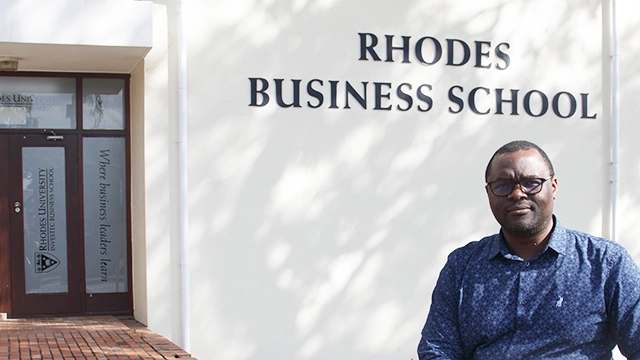
Plans are underway for the brand-new Postgraduate Diploma in Advancement and Resource Mobilisation to be offered next year by the Rhodes Business School.
Advancement refers to the integration of strategic thinking within an organisation or institution that relies on multiple sources of financial and non-financial resources to ensure its longevity. Often associated with philanthropy, grant, donor, alumni and corporate social investment relationships and partnerships, it does this by mobilising resources through an effective orchestration of communications, marketing, public liaison, external relations, and fundraising with the requisite legal and financial associated activities to make the case for support.
Course co-ordinator, Dr Andile Mtotywa, says that although the diploma is well suited for fundraisers, communication and marketing personnel, university development officers, as well as organisational CEOs and Directors of non-profit (NPOs) and NGOs, any business professional, especially within the sustainability realm, can benefit. “It is also important to note that this programme is pegged at NQF level 8, thus also creating a pathway to the MBA”, confirms Dr Mtotywa.
“We are currently one of two Business Schools in South Africa to offer the course. With the current global economic challenges and huge need for social redress, advancement and resource mobilisation expertise has become critical for the sustainability of many organisations who are having to compete for a smaller share of whatever resources required to deliver their mandate,” he says.
Dr Mtotywa attributes these financial challenges to continued slow economic growth, the impacts of “triple challenges” – unemployment, poverty and inequality, that aftermath of the COVID-19 pandemic that has caused havoc around the world, and changes in the geopolitical tensions among “superpowers”.
“Many companies have had to redistribute or reduce their social investment initiatives because of financial uncertainties. Ironically, the beneficiaries of these initiatives need financing now more than ever due to growing social ills and increasing socio-economic challenges,” Dr Mtotywa explains.
In the same vein, the Rhodes Business School is aware that those who may benefit most from the course probably are not sufficiently well-resourced to enrol. “With this in mind, we are working on a funding model to part sponsor some of these deserving, non-profit practitioners who aren’t able to fund themselves, especially those working to promote the Sustainable Development Goals (SDGs),” said Dr Mtotywa. “We believe in capacitating these ‘connectors of change’, as their work benefits society at large.”
The Postgraduate Diploma in Advancement and Resource Mobilisation strives to grow and build the number and quality of working Advancement professionals in Africa who can engage systematically and purposefully with their internal and external stakeholders to attract resources and, thus, contribute to the long-term sustainability of these non-commercially driven entities.
The programme will also seek to give credence to Advancement principles that can be used to inform integrated and holistic practices by promoting research and the creation and dissemination of knowledge in this area.
The Rhodes Business School’s ethos of “Leadership for Sustainability” underlies all subjects in the curriculum by encouraging thinking around economic, social and environmental sustainability. In addition, the new programme perfectly complements the other Business School postgraduate diplomas.
For more information, please click here.
